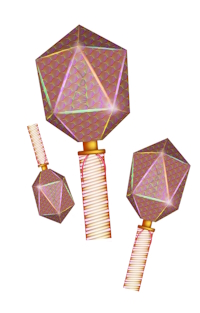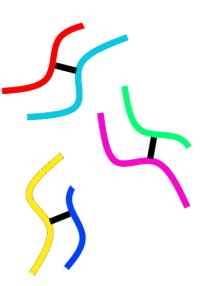|
To view this email as a web page, click here. |
 |
|
Welcome to issue #104
Use Mascot to create your own, sample-specific spectral libraries for DIA experiments.
This month's highlighted publication unravels the components of a Salmonella capsid.
If you have a recent publication that you would like us to consider for an upcoming Newsletter, please
send us a PDF or a URL.
Planning to crosslink proteins with DSSO? We have tips just for you.
Please have a read and feel free to contact us if you have any comments or questions.
|
|
|
|
 |
 |
|
Mascot: The trusted reference standard for protein identification by mass spectrometry for 25 years
|
 |
 |
|
Generating high quality spectral libraries for DIA-MS
Many software solutions for Data-Independent Acquisition (DIA) require libraries of MS/MS spectra for peptide identification. The spectra are typically collected from Data-Dependent Acquisition (DDA) experiments, either by using a machine learning model to create predicted DDA spectra, or running the sample in DDA mode and creating a library from the search results.
Mascot search results can be used for training ML models, but you can also create high-quality spectral libraries specific to your experiment using Mascot Daemon, Mascot Distiller and Mascot Server.
We demonstrate this process using a published dataset to generate MSP format spectral libraries. Raw file processing is done by Mascot Distiller, automation with Mascot Daemon and the libraries generated with the spectral library crawler in Mascot Server.
The pipeline consists of 5 steps:
- Determine suitable search parameters for the dataset
- Perform standard searches for abundant modifications and non-specific cleavage products
- Calculate an expect value cut-off for approximately 1% peptide FDR for each search set
- Run the library crawler to create the libraries
- Download the library in MSP format
Many of the steps are automated using Mascot Daemon, but some manual intervention is required. Creating high-quality spectral libraries needs human judgement, which is unwise to automate away.
You can copy the MSP file from the library's 'current' directory and use it with dedicated DIA tools such as Skyline and DIA-NN. In addition, a full import log is available in Database Manager, which documents exactly what was and was not imported into the library.
For details on how to create your own libraries,
please read the blog.
|
 |
 |
 |
 |
|
Featured publication using Mascot
Here we highlight a recent interesting and important publication that employs Mascot for protein identification, quantitation, or characterization. If you would like one of your papers highlighted here, please send us a PDF or a URL.
|
|
|
Mass Spectral Analyses of Salmonella Myovirus SPN3US Reveal Conserved and Divergent Themes in Proteolytic Maturation of Large Icosahedral Capsids
Aaron Scheuch, Sara A. M. Moran, Julia N. Faraone, Sophia R. Unwin, Gialinh Vu, Andrea Denisse Benítez, Nurul Humaira Mohd Redzuan, Dana Molleur, Sammy Pardo, Susan T. Weintraub and Julie A. Thomas
Viruses 2023, 15, 723
The authors investigated the capsid proteins of a Salmonella myovirus in order to define the composition of the mature head and elucidate how it is modified by proteolysis during assembly. The capsid is composed of >50 different gene products, including many that are packaged along with the 240 kb genome and ejected into the host cell.
They loaded high concentrations of phage proteins onto the SDS-PAGE gels to enhance sequence coverage and localization of sites of proteolysis. After de-staining, proteins in the gel slices were reduced and alkylated before digestion with trypsin, followed by LC-MS/MS. This yielded identification of 102 phage proteins in the WT virions.
To classify the virion proteins into head versus tail components, three replicates of purified tailless particles were analyzed in the same experiment as the WT phage, with fifty-three proteins assigned as components of the head and 30 as belonging to the tail.
Specification of "semi-trypsin" for database searching of the MS files led to the identification of 14 prohead protease cleavage sites in 9 proteins. including eight sites not previously identified in head proteins in vivo.
Finally, they were able to enhance the annotation of the phage genomes by determining the revised co-ordinates for the ORF_0139: these are 116,201–117,043 in GenBank Accession JN641803.
|

|
 |
 |
 |
|
Crosslinking proteins with DSSO
Disuccinimidyl sulfoxide (DSSO) is a commonly used crosslinking reagent, suitable for both CID-cleavable and intact crosslink analysis. It is available as a standard definition in Unimod, Xlink:DSSO, and ships with Mascot Server. You need only two more things to get started with data analysis in Mascot: add the protein sequences as a searchable database, and create a crosslinking method. The crosslinking method defines which linker is used to crosslink which protein sequences.
At our ASMS 2023 breakfast meeting, Professor Susan Weintraub gave a step-by-step description of setting up a DSSO crosslinking experiment using Mascot. The slides are now available on our website and contain lots of practical tips: Connecting the Prots: Analyzing Crosslinked Data in a Core Lab Using Mascot.
Our new training course module on crosslinking additionally discusses validating intact crosslinks, and we also have tips how to peak pick intact crosslink spectra with Mascot Distiller.
And if you get stuck, send your question to support@matrixscience.com and we're happy to help.
|
 |
 |
 |
 |
|
About Matrix Science
Matrix Science is a provider of bioinformatics tools to proteomics researchers and scientists, enabling the rapid, confident identification and quantitation of proteins. Mascot software products fully support data from mass spectrometry instruments made by Agilent, Bruker, Sciex, Shimadzu, Thermo Scientific, and Waters.
|

|
|
Please contact us or one of our marketing partners for more information on how you can power your proteomics with Mascot. Read more about the company on our about page.
|



|
 |
|
|